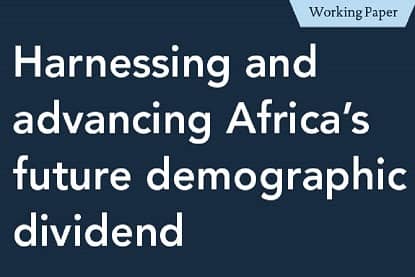Population ageing and decline are becoming increasingly global phenomena. Across the world, populations are getting older and the proportion of young people is falling. In more and more places, population size is declining. First of the working-age population, and ultimately of the total population. This represents a fundamental shift from the pattern over the past half-century, when populations grew, labour supply increased and there was a global trend towards increasingly younger populations.
This global demographic transition also has major implications for the Netherlands, but this is still barely on the radar, both among the public and in policy circles. In this project, the WRR examines the implications for the structure of the Dutch economy, for our labour market and labour migration, for Dutch trade and for our pension provision. What policies are needed to respond to the risks and opportunities associated with demographic changes beyond our borders? What can the Dutch government do?
The project 'Netherlands in an Ageing and Shrinking World' is divided into two sub-reports: European ageing and pensions on the one hand, and on the other hand global population ageing and decline in relation to Dutch trade and labour migration. In both domains, the consequences for the Netherlands of population ageing and decline beyond our borders could be far-reaching. Therefore, the WRR considers it important that the Netherlands is prepared for this. The research will formulate policy directions to respond to the possible impact of global demographic changes.
A Steady Global Demographic Transition
The world stands on the brink of a gradual but steady demographic transformation. Across the globe, life expectancy has increased in recent years and mortality rates and birth rates have declined. As a result, we see ageing and population decline occurring in more and more places – first of the working-age population and in many cases later of the total population. However, this transition is not proceeding at the same pace everywhere – some countries will shrink while others will continue to grow for some time.
China, for instance, will age and shrink rapidly over the next 25 years – the potential working-age population will decline from approximately 1 billion currently, to 750 million by the middle of the century. Closer to the Netherlands, a country like Poland will also experience rapid population decline. Its working-age population will decline by more than a third over the next three decades. Other countries, however, will remain relatively young for some time, with many people of working age. This can be seen in the figure, which shows the number of potential workers relative to the rest of the population. We see that whilst areas such as China and the Eastern EU countries had a relatively high labour supply over the past two decades, this will decline rapidly. This is shifting quickly towards India and in the longer term towards Africa.
Image: © UN / projections medium-variant
Trade, Labour and Migration
The places in the world where abundant labour potential exists are therefore changing. In this project, we study the consequences for the Netherlands of this shift in global labour potential. Our economy and society is heavily dependent on labour in and from other countries. Shops are full of products made elsewhere, and our own production also depends on intermediate products that come here through trade flows. Migrant workers provide all sorts of services here in the Netherlands and produce goods. For example, in construction, logistics, technology and agriculture – but increasingly also in a sector such as healthcare.
The demographic transition in countries with which the Netherlands has close economic ties through trade or labour migration will inevitably have consequences here too. Consider, for example, our economic dependence on labour migration. When important countries of origin such as Poland experience population decline and ageing, the inflow of personnel from those countries will decrease. This means that for labour migration in the future, we will become more dependent on inflows from countries outside the EU. Or our labour market may tighten further. Or consider trade patterns: in China, labour is rapidly becoming scarcer. This may shift China's position as the 'factory of the world' in favour of still relatively young countries such as India and Indonesia.
Responding to Demographic Changes Outside the Netherlands
Dutch trade and production must adapt to these developments, and our policy must respond. This can be done by establishing closer diplomatic and economic ties with countries with a (future) demographic dividend. Consider, for example, trade relations, development partnerships, and migration partnerships. Dutch trade policy and labour migration policy can contribute to this, at national level and within the European Union.
The publication on the impact of global population ageing and decline on Dutch trade and migration is expected in the second half of 2025.
European Ageing
Ageing also has implications for the Netherlands' position within the European Union. The Netherlands is in an exceptional position. Within Europe, we are relatively less 'grey' and our pension provision is much more based on pension savings accumulated over decades. In an ageing Europe, such differences can lead to tensions between EU countries. The question is how these change the Netherlands' position within the European political balance of power.
The WRR investigated this in the report European Ageing in Focus: Dealing with Pension and Budgetary Risks. This report was presented to the Minister of Finance on behalf of the Cabinet on 25 September 2024. An English translation of the report is expected to be published in the second half of 2025 in the Research for Policy series. Studies by the Netherlands Council for Government Policy by Springer publishers.
News

Harnessing and advancing Africa’s future demographic dividend
Africa’s demographic future will play a defining role in shaping the continent’s development trajectory and position in the ...
Read more
Demographic developments abroad have an impact on the Dutch economy and trade
Major demographic changes abroad can affect trade flows to and from the Netherlands. This is shown by two Working Papers ...
Read more
Netherlands must better prepare for an ageing EU
Europe is ageing at a rapid pace. The proportion of pensioners in Europe will roughly double over the next thirty years. Without ...
Read more